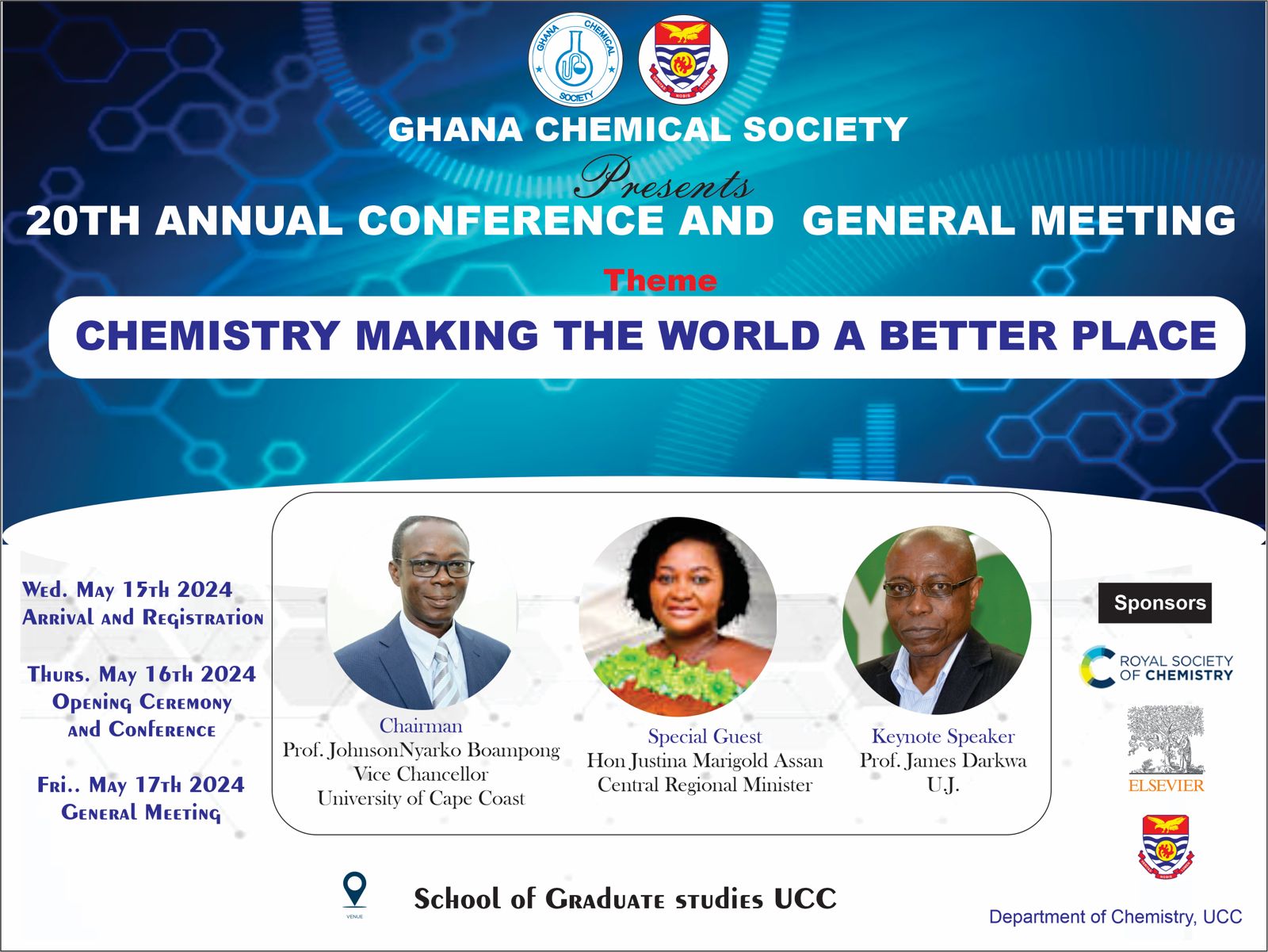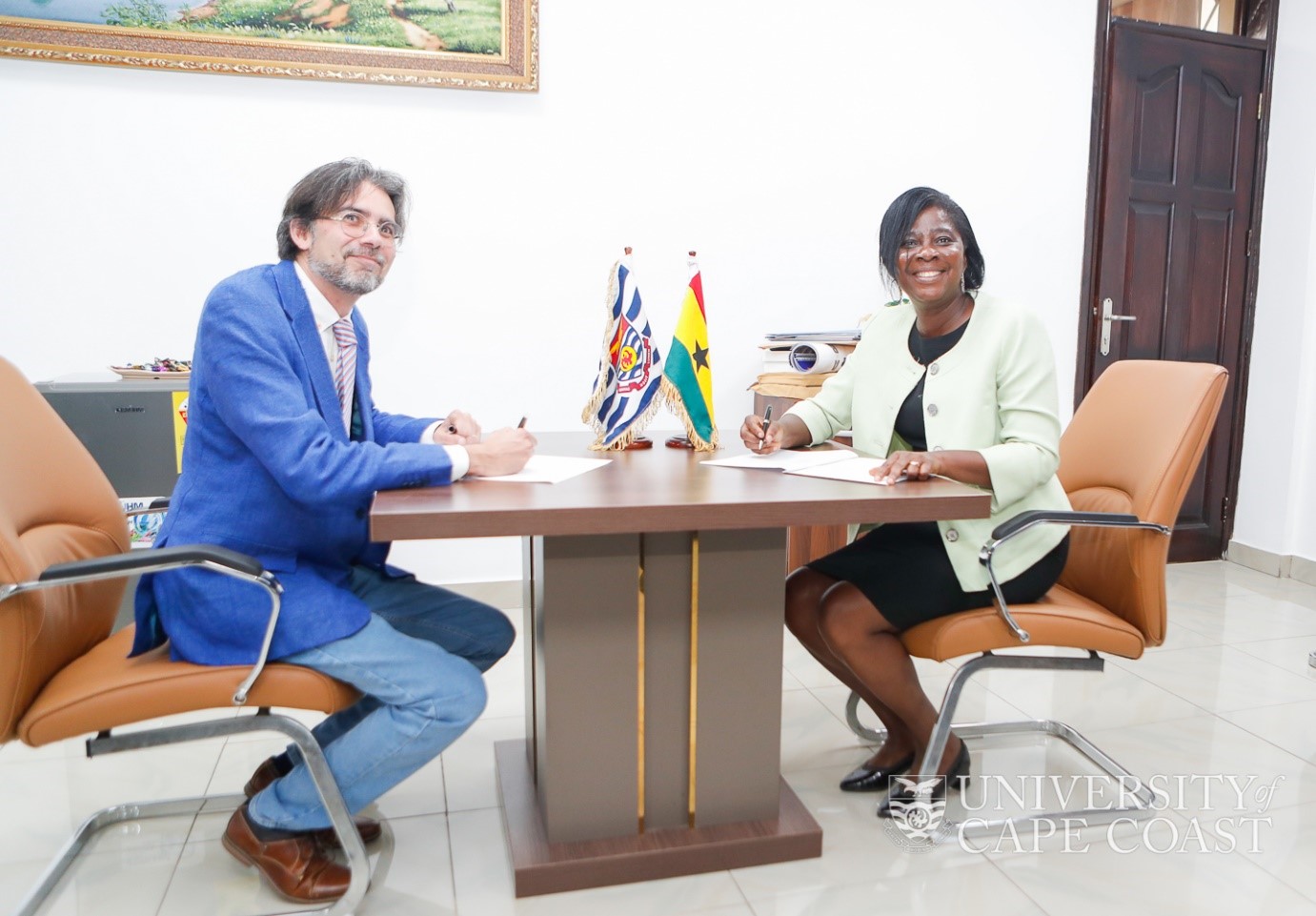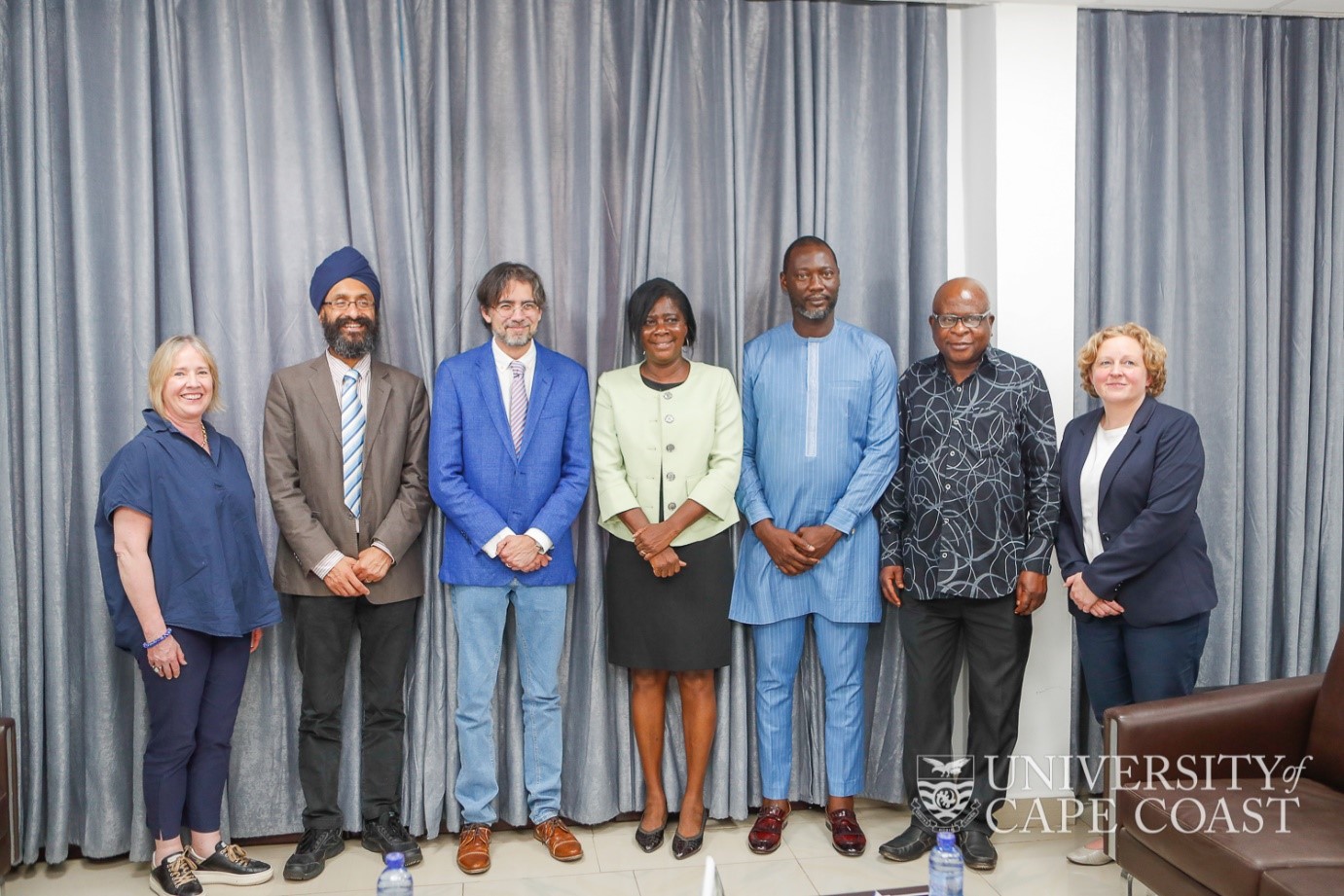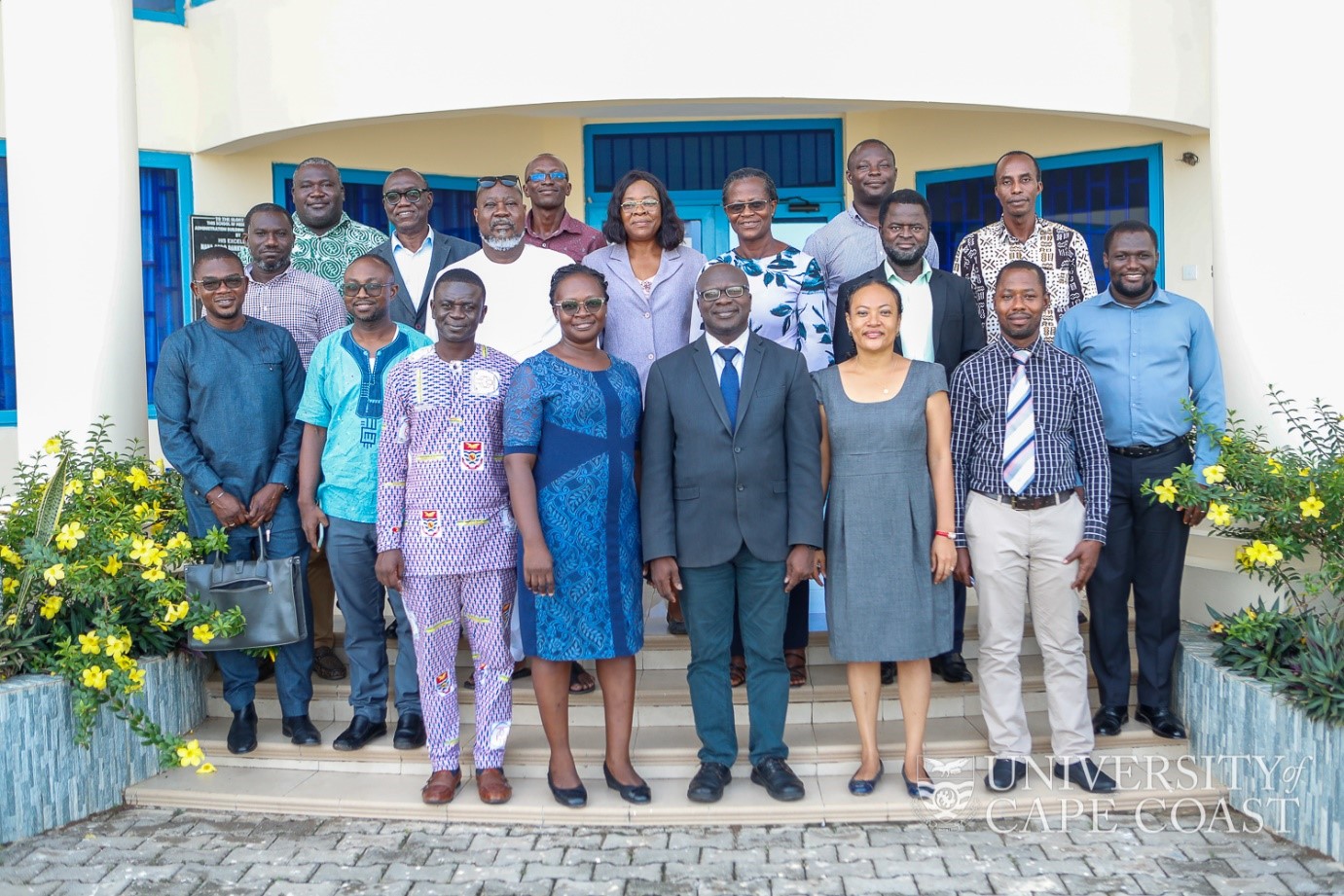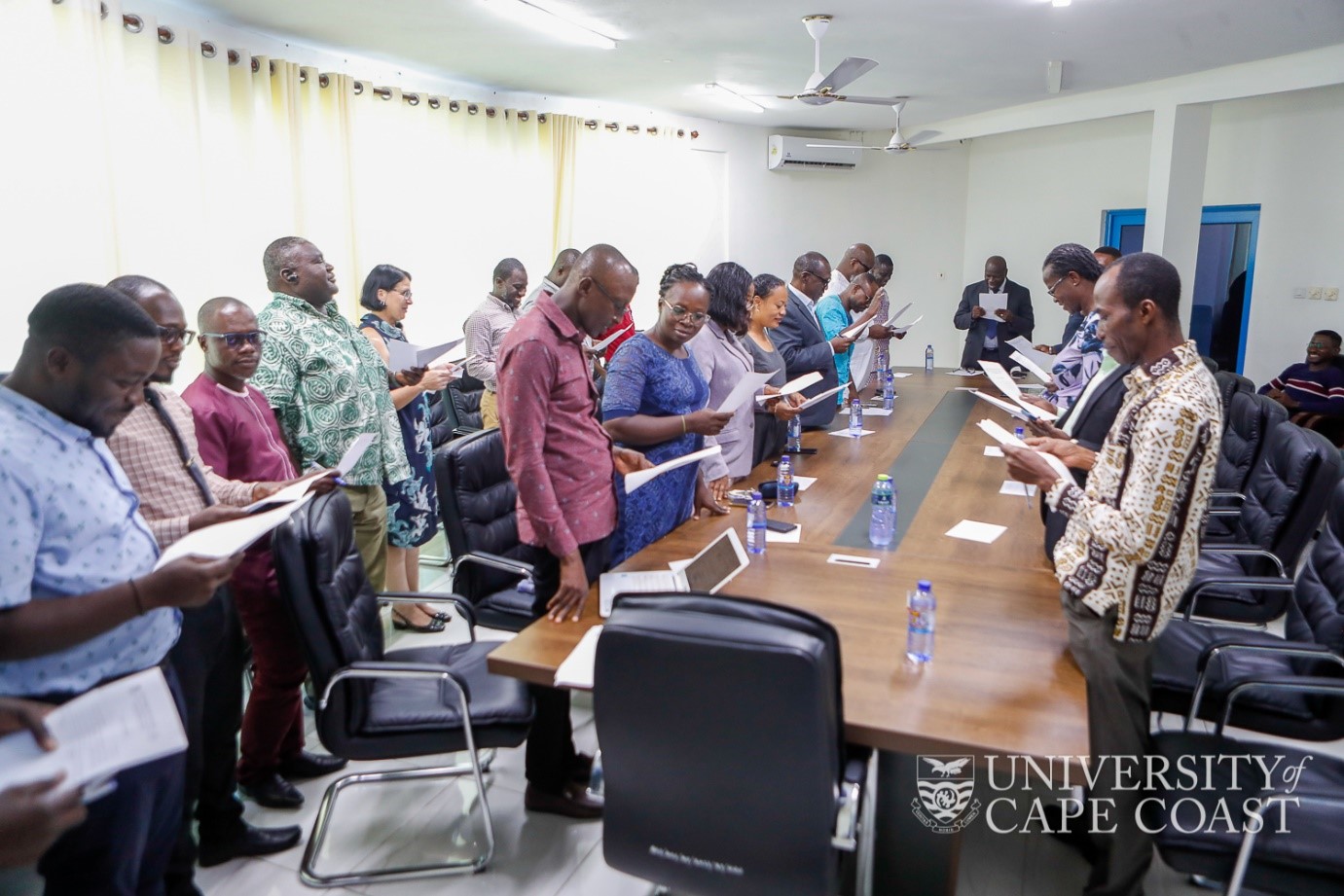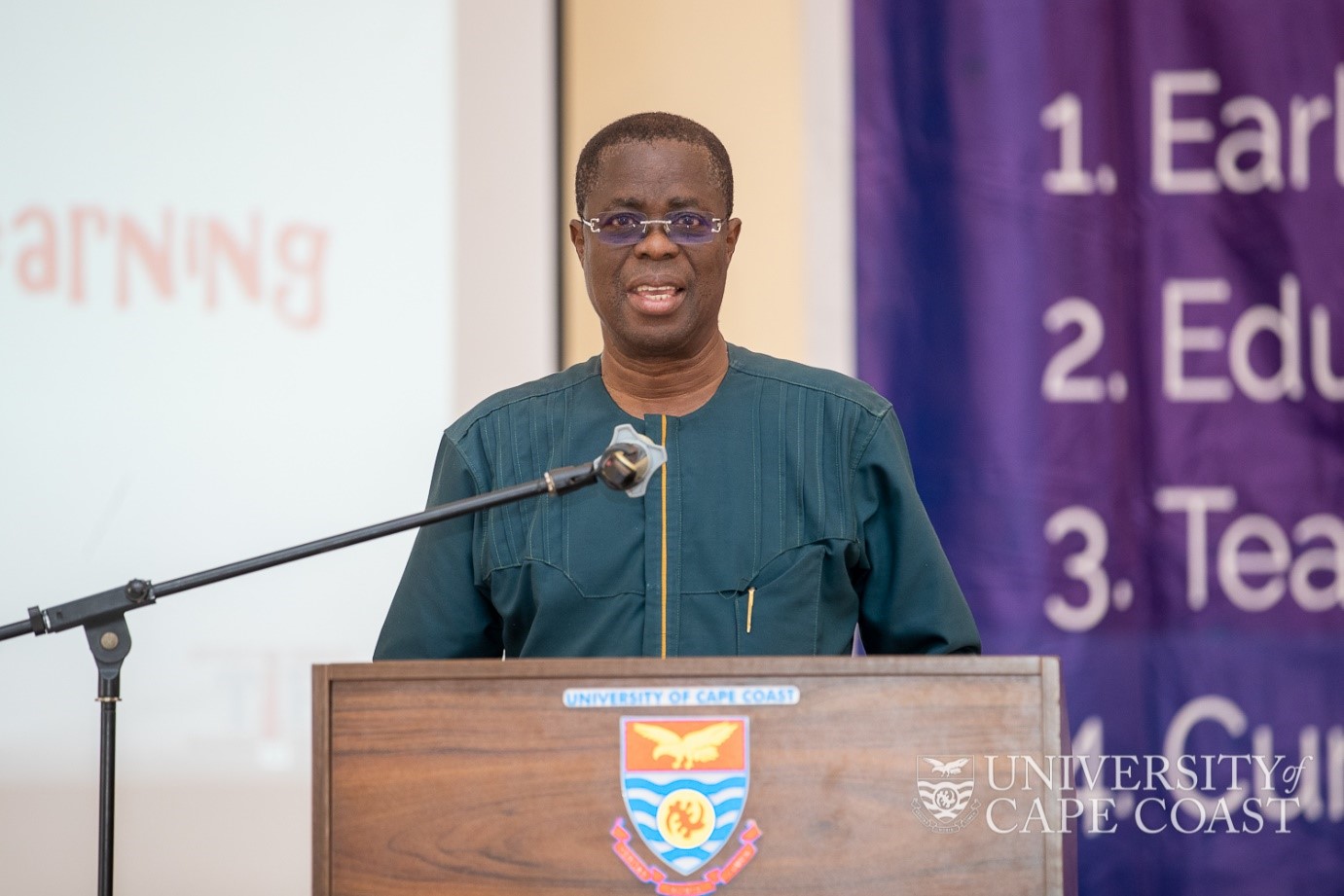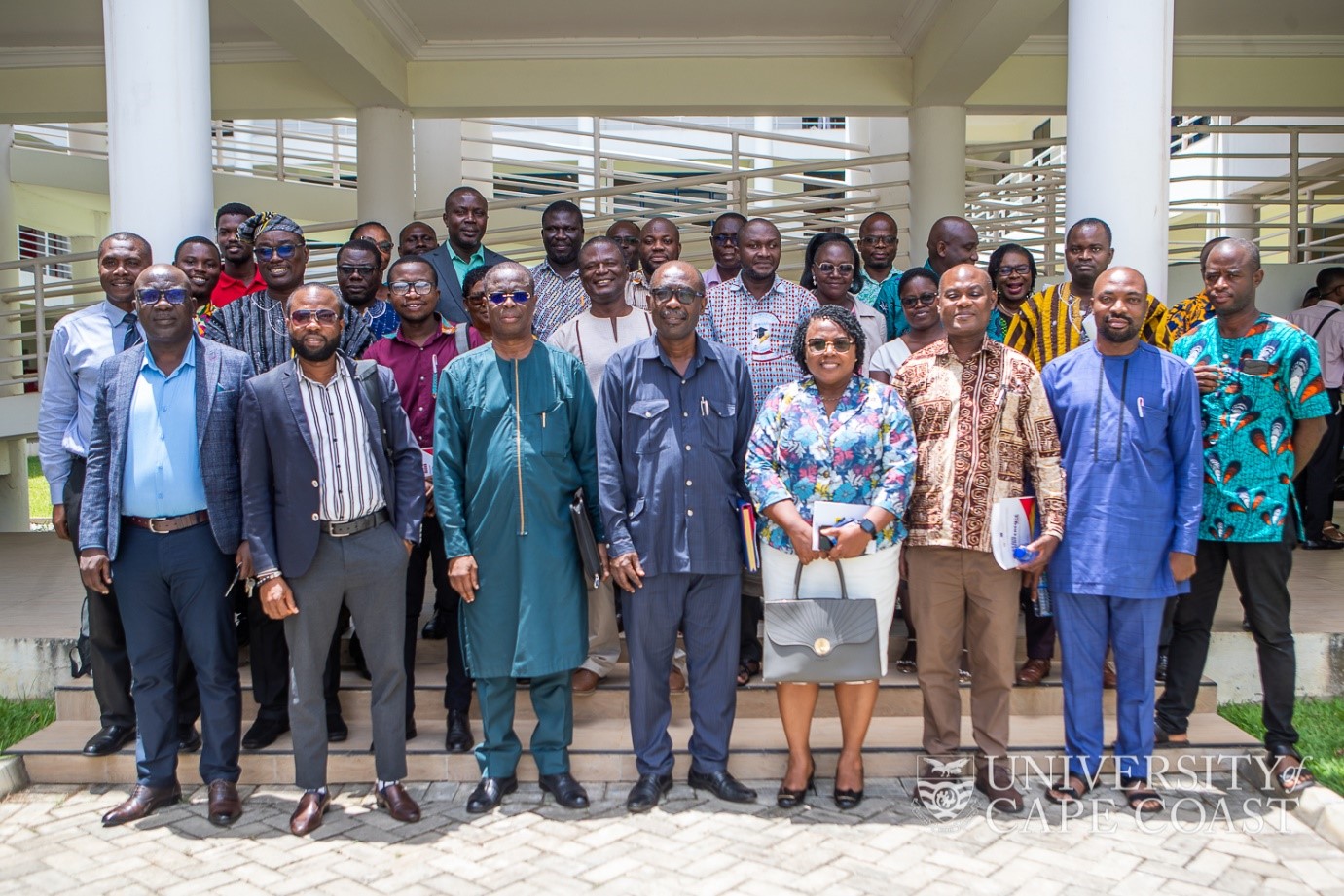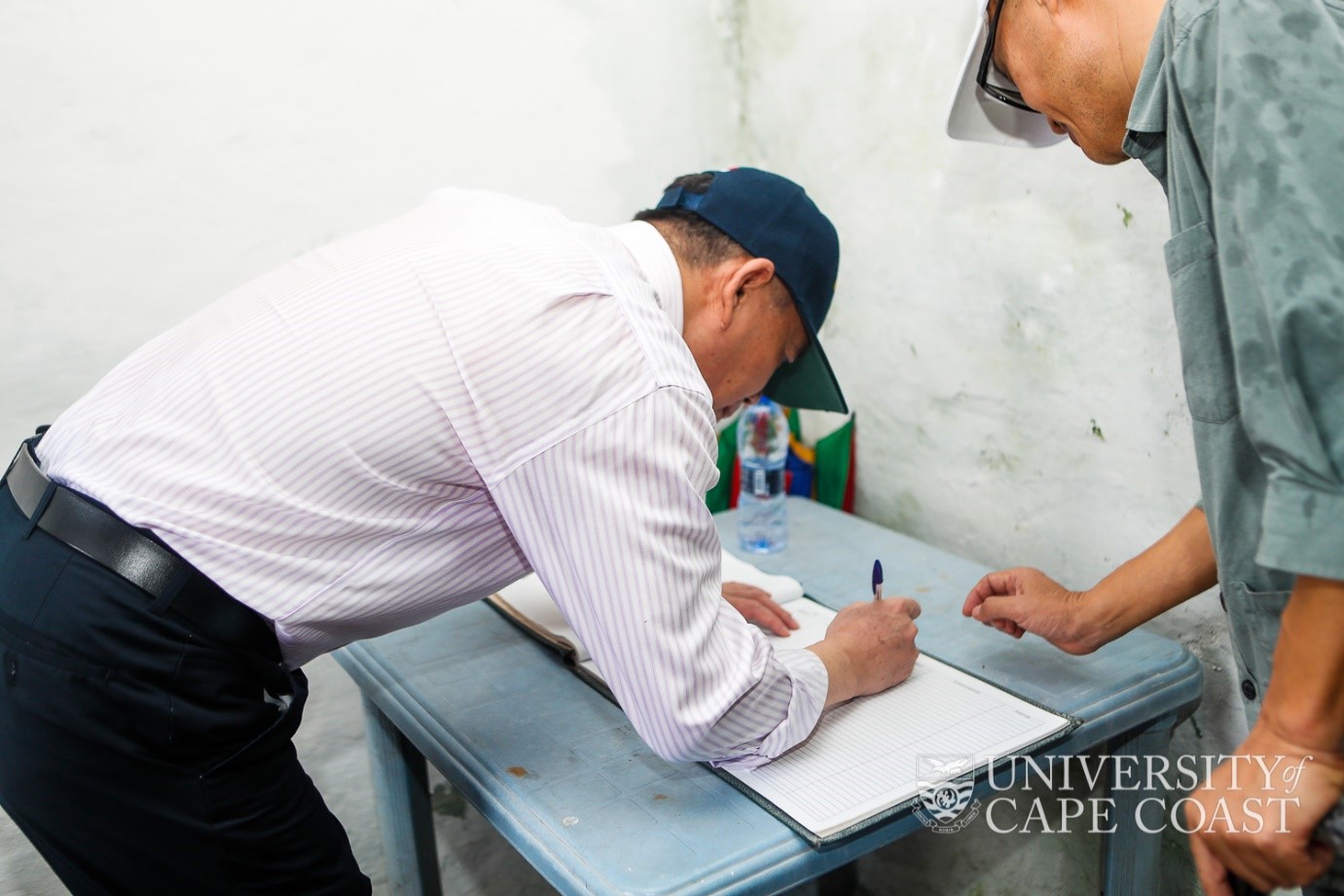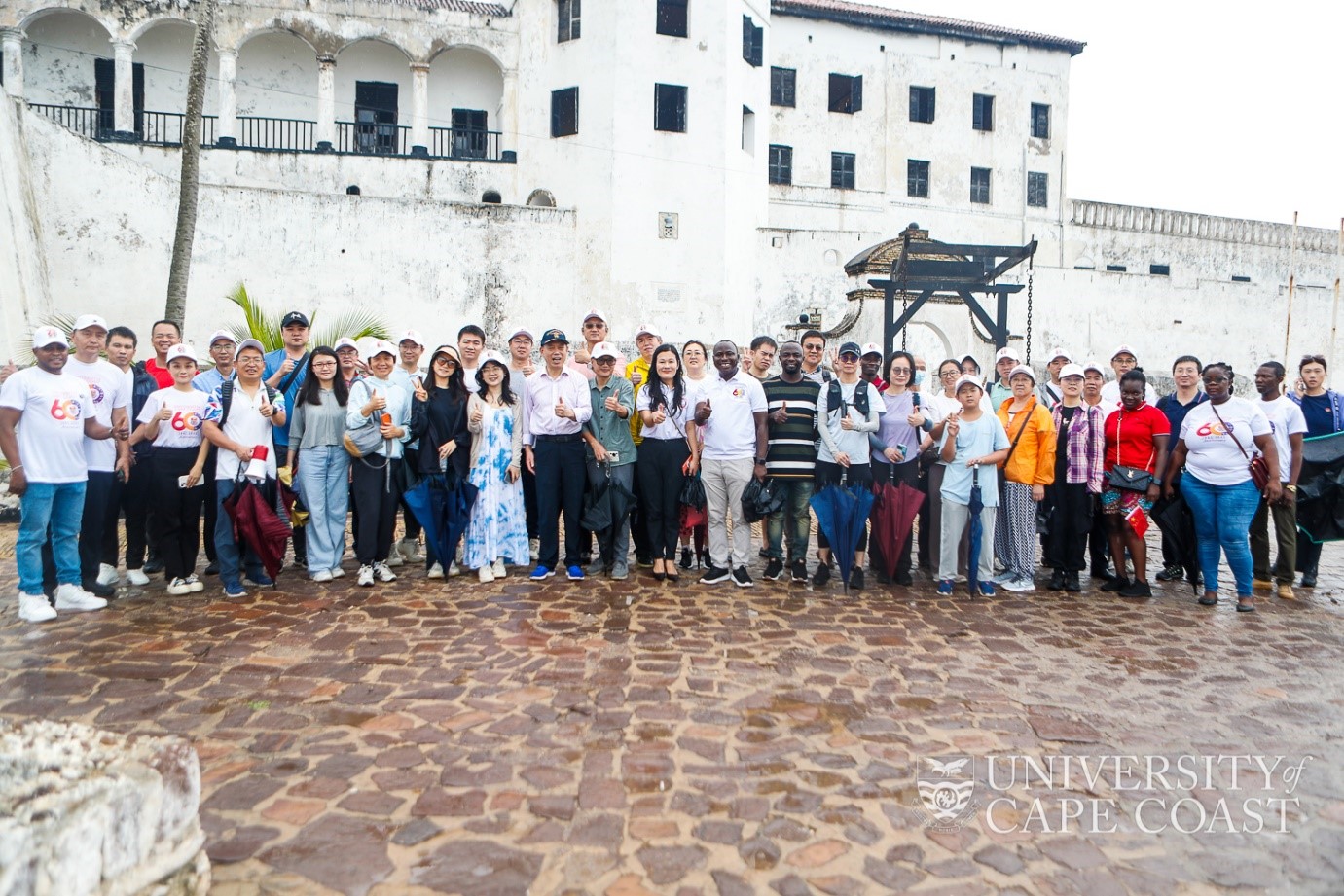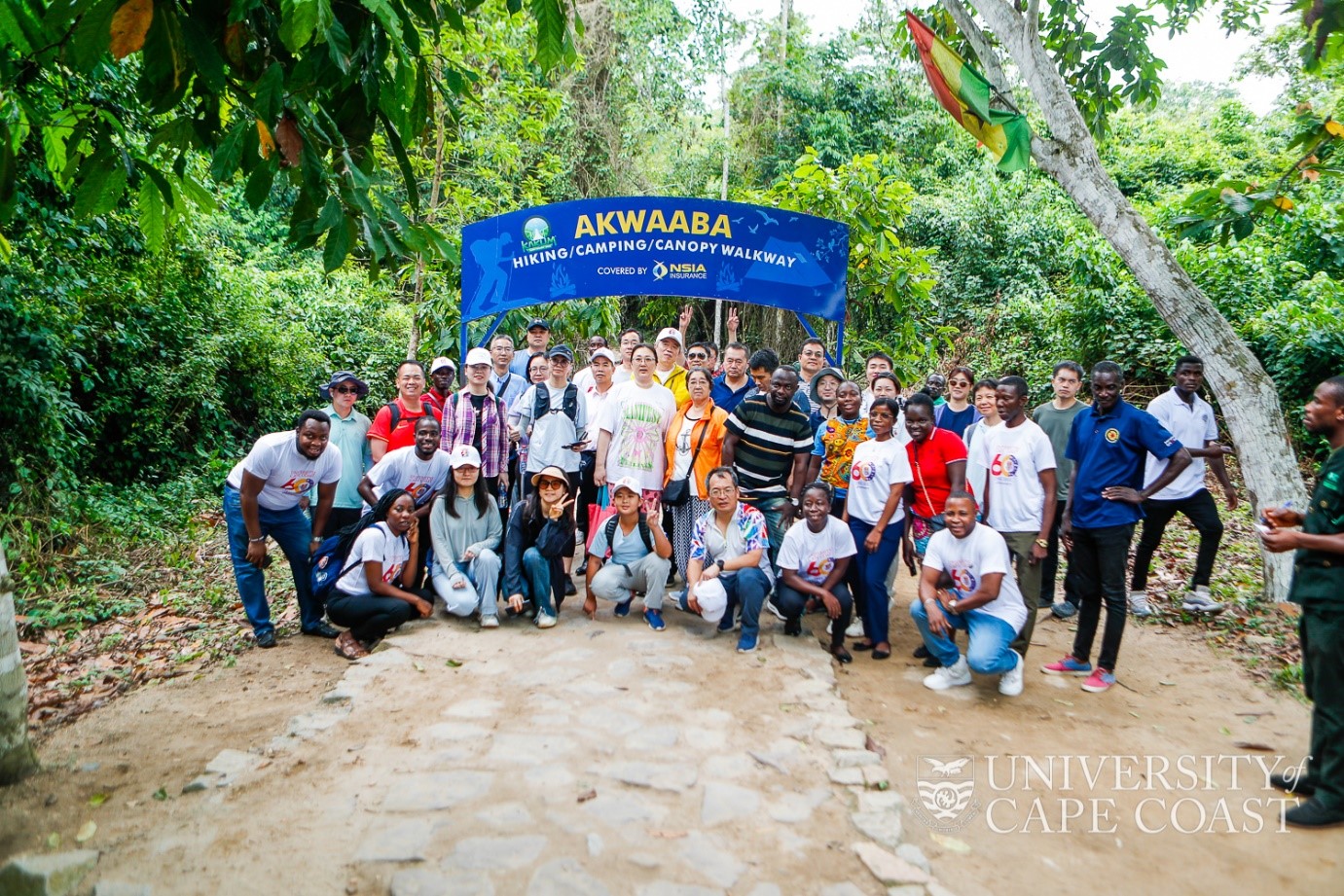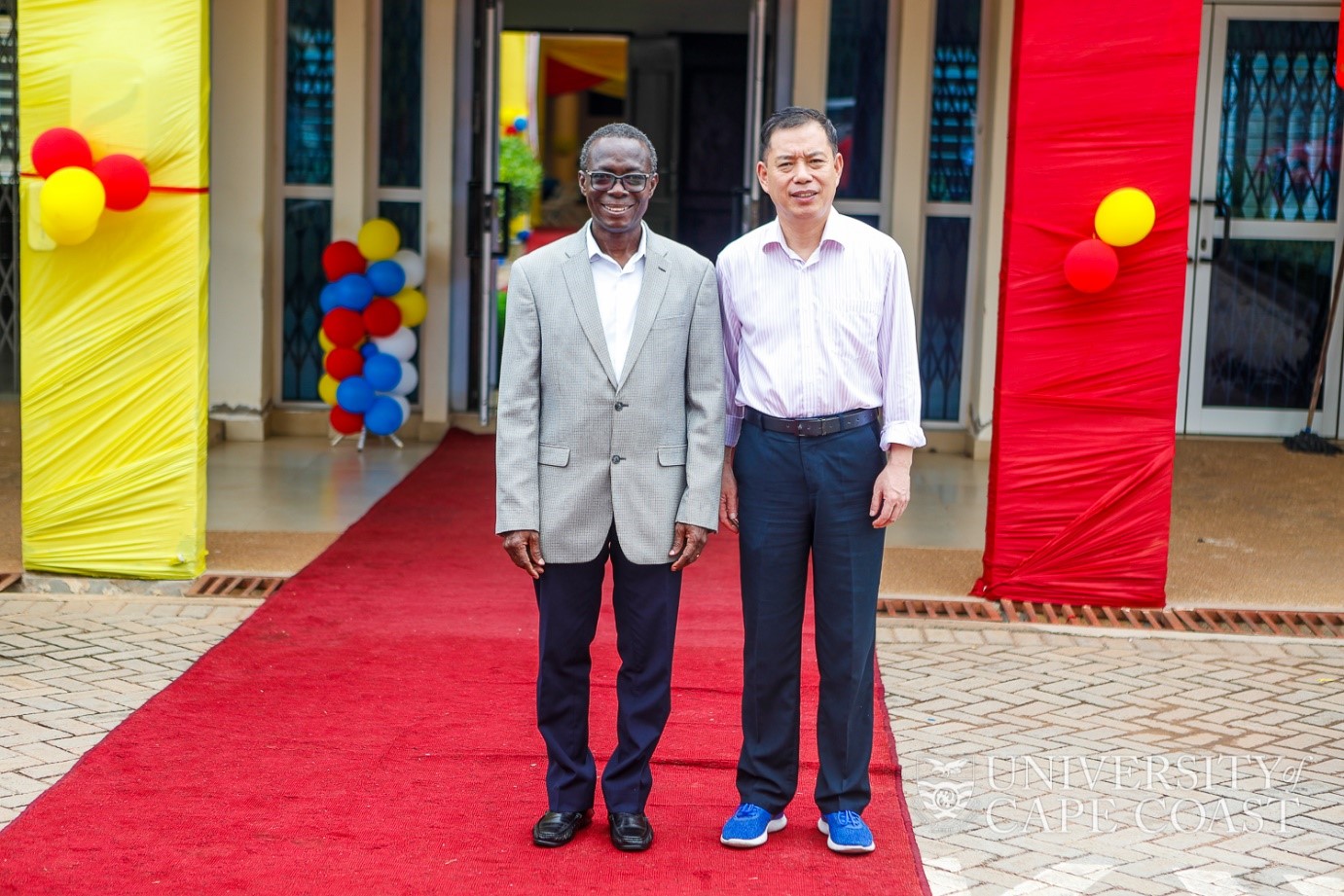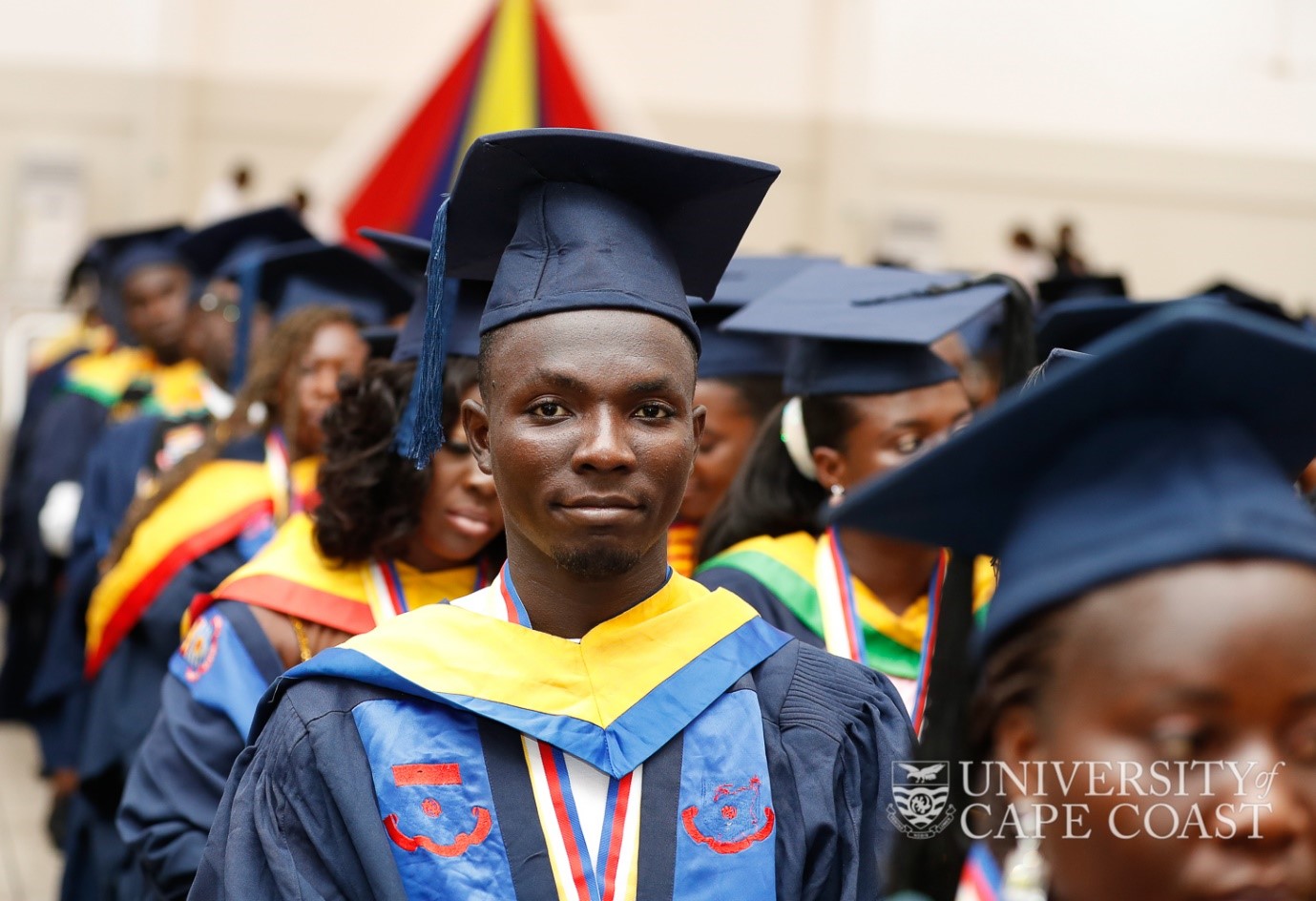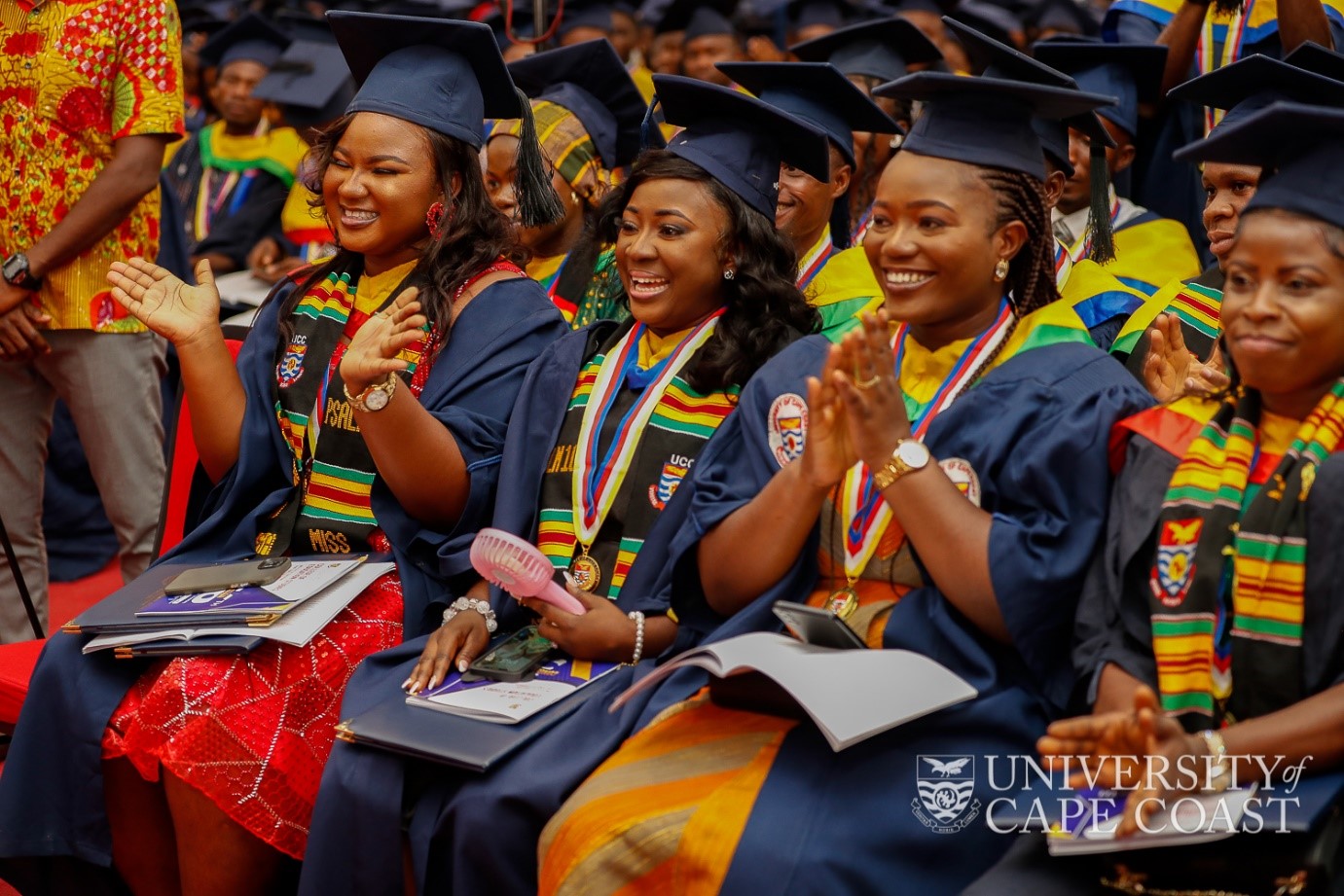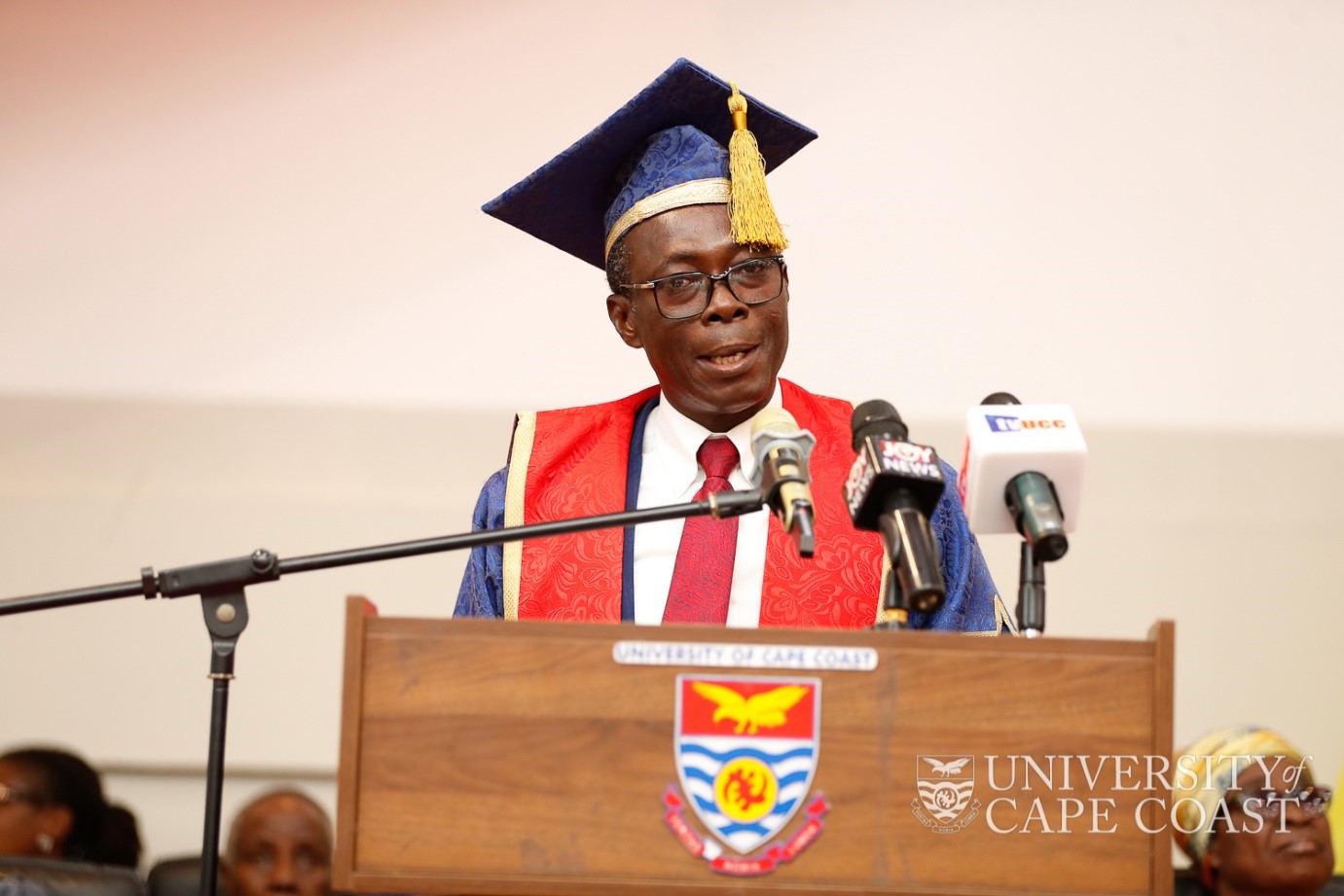ADMISSION TO CAREER-ORIENTED POST-GRADUATE PROGRAMMES FOR THE 2024 SANDWICH SESSION
Applications are invited from qualified persons for admission into career-oriented post graduate programmes (SANDWICH) of the University of Cape Coast for the 2024 Sandwich Session.
NB: Applicants are to note that names on their academic certificate(s) should correspond to the names on their application form.
Vouchers for online application are up for sale at the centres listed below:
1.0 SALE CENTRES
(a) Cashier’s Office, University of Cape Coast (Mode of payment – CASH)
(b) University of Cape Coast – Accra Office, Tesano – Accra (Mode of payment – CASH)
(c) All Network Branches of Ghana Post Office Nationwide
(d) All Network Branches of GCB Bank Nationwide
(e) All Network Branches of ADB Bank Nationwide
(f) All Network Branches of GT Bank Nationwide
(g) All Network Branches of ARB Apex Bank Nationwide
(h) All Network Branches of Republic Bank Nationwide
(i) All Network Branches of Consolidated Bank Nationwide
(j) All Network Branches of Zenith Bank Nationwide
(k) All Network Branches of Prudential Bank Nationwide
(l) All Network Branches of Cal Bank Nationwide
(m) All Network Branches of National Investment Bank Nationwide
(n) All Network Branches of OmniBsic Bank Nationwide.
1.1 COST OF APPLICATION VOUCHERS
i. Application Fee - GH¢ 320.00 per voucher
2.0 GENERAL ENTRY REQUIREMENTS
2.1 MA/MSc/MEd/MBA
A candidate seeking admission to pursue an MA/MSc/MEd/MBA degree programmes must:
i. Have obtained a good first degree in an appropriate field of study from a recognized university.
ii. All Non UCC Alumni are to submit an official transcript of academic record (UCC Alumni are to provide only their Registration Numbers).
iii. Satisfy additional requirement(s) prescribed by the College/Faculty/School/Department concerned, such as selection test/interview.
2.1.1 NOTE: The M. Phil/M. Com Programmes are for applicants with Non-Research Masters Only
2.2 Postgraduate Diploma in Education (PGDE)
A candidate seeking admission to the Postgraduate Diploma programme must:
i. Have obtained a first degree in a relevant area of study and taught for two years:
ii. All Non UCC Alumni are to submit an official transcript of academic record (UCC Alumni are to provide only their Registration Numbers).
iii. Satisfy additional requirement(s) prescribed by the College/Faculty/Centre for Teacher Professional Development, such as selection interview.
In special cases, applicants with Third Class Bachelor’s degree with a minimum of three years post-qualification experience may also be considered. Applicants will be required to attend and pass a selection interview.
3.0 DURATION OF PROGRAMMES/SCHEME OF EXAMINATION
3.1 MA/MSc/MEd by Course Work
Two (2) sandwich sessions of 8-weeks duration each.
3.2 Master of Business Administration (MBA) by Course Work and Dissertation
Three (3) sandwich sessions of 8-weeks duration each.
3.2 Postgraduate Diploma in Education (PGDE) by Course Work and Long Essay with Supervised Teaching Practice
Two (2) sandwich sessions of 8-weeks duration each.
NOTE: (August to October each calendar year constitute one sandwich session)
PROGRAMMES AVAILABLE IN THE COLLEGES / FACULTIES / SCHOOLS / DEPARTMENTS/CENTRES/INSTITUTES
4.0 COLLEGE OF HUMANITIES AND LEGAL STUDIES
4.1 FACULTY OF SOCIAL SCIENCES
4.1.2 Institute for Oil and Gas Studies
a. Master of Business Administration – (MBA) in Oil and Gas Management
The programme targets the following categories of persons: public and civil servants; officials working with Non-Governmental Organisations (NGOs) related to the oil and gas industry, engineers, scientists and other technical officers who require managerial training in oil and gas management, and graduates from relevant disciplines.
Specific Entry Requirements
i. Applicants should have a good first degree (at least Second Class Lower Division) in any field of study from a recognized academic institution.
ii. Satisfy any additional requirements prescribed by the Institute. These may include relevant work experience, a written entrance examination and an interview.
Fees per Sandwich Session
i. Fresh Students - GH ¢ 6,500.00
ii. Continuing Students - GH ¢ 6,300.00
b. Master of Arts – (MA) in Communication in Oil and Gas Management
Persons targeted under this programme include: Communication Practitioners, Administrators in the oil and gas industry, Non-Governmental Organisations and interested members of the general public.
Specific Entry Requirements
i. Applicants should have a good first degree (at least Second Class Lower Division) in any field of study from a recognized academic institution.
ii. Satisfy any additional requirements prescribed by the Institute. These may include relevant work experience, a written entrance examination and an interview.
Fees per sandwich Session
i. Fresh Students - GH ¢ 5,940.00
ii. Continuing Students - GH ¢ 5,680.00
c. Master of Science – (MSc) in Oil and Gas Resource Management
The programme is targeted at the following categories of persons and agencies; Security Agencies, Educationists, District Assemblies, Persons in the Oil and Gas Allied Industries, Relevant Public Sector Institutions, NADMO, Civil Society Organisations, Journalists, Religious Community and Traditional Leaders.
Specific Entry Requirements
i. Applicants should have a good first degree (at least Second Class Lower Division) in any field of study from a recognized academic institution.
ii. Satisfy any additional requirements prescribed by the Institute. These may include relevant work experience, a written entrance examination and an interview.
Fees per Sandwich Session
i. Fresh Students - GH ¢ 5,940.00
ii. Continuing Students - GH ¢ 5,680.00
4.1.3 Department of Geography and Regional Planning
a. Master of Science (MSc) in Disaster Risk Management
Target Groups
Persons targeted under this programme include teachers in related fields such as: mining, civil and mechanical engineering, forestry and related fields; personnel from the Ghana Armed Forces, the Ghana Police Service, Immigration Service, Customs, Excise and Preventive Services (CEPS), Ghana Health Service (GHS), Non-Governmental Organizations (NGOs), Environmental Protection Agency (EPA), the National Disaster Management Organization (NADMO) and industries.
Entry Requirements
i. Applicants should have a good first degree (at least Second Class Lower Division) in any field of study from a recognized academic institution.
ii. Satisfy any additional requirements prescribed by the Faculty/Department. These may include relevant work experience, a written entrance examination and an interview.
Special Admissions
In special cases, an applicant with a weak first degree (i.e third class or pass) or those with a Diploma in any field in Social Sciences, Engineering, or other Safety and Disaster management related programmes from an accredited institution may also be admitted into the MSc Disaster Management. Such applicant must:
i. Have considerable knowledge and experience in safety and disaster related issues or have worked at a management position for at least five years;
ii. Be at least 30 years old and
iii. Pass a selection interview conducted by the Department.
Fees per Sandwich Session
i. Fresh Students - GH ¢ 5,150.00
ii. Continuing Students - GH ¢ 4,900.0
a. Master of Science (MSc) in Land Policy and Administration
Target Groups
The programme targets the following categories of persons: Traditional Authorities (Chiefs and Queen Mothers); Local Authorities (Metropolitan/Municipal/District Assemblies – MMDA’s); NGO’s and Civil Organizations; Legislators, the Judiciary; the Media; Religious Bodies, Public and Civil Servants.
Entry Requirements
iii. Applicants should have a good first degree (at least Second Class Lower Division) in any field of study from a recognized academic institution.
iv. Satisfy any additional requirements prescribed by the Faculty/Department. These may include relevant work experience, a written entrance examination and an interview.
Special Admissions
In special cases, an applicant with a weak first degree (i.e third class or pass) or those with a Diploma in any field in Social Sciences, Engineering, or other Safety and Disaster management related programmes from an accredited institution may also be admitted into the MSc Disaster Management. Such applicant must:
b. Have considerable knowledge and experience in safety and disaster related issues or have worked at a management position for at least five years;
c. Be at least 30 years old and
d. Pass a selection interview conducted by the Department.
Fees per Sandwich Session
i. Fresh Students - GH ¢ 5,150.00
ii. Continuing Students - GH ¢ 4,900.00
4.1.4 Department of Population and Health
a. Master of Arts (MA) in Population and Health
Specific Entry Requirements
i. Applicants to this programme must have obtained a Bachelor of Arts (with Second Class) in one of the following areas; Population, Health, Geography, Economics, Sociology, Development Studies, Anthropology, Psychology, Political Science, Business Management, Actuarial Science, Mathematics and Statistics.
ii. Candidates will have to pass an interview to be conducted by the Department.
Fees per Sandwich Session
i. Fresh Students - GH¢ 4,000.00
4.1.5 Department of Sociology and Anthropology
Master of Arts (MA) in Sociology of Peace and Security
The goals of the programme are to provide students with the necessary knowledge and skills to improve their analysis of peace and security as well as skills in the analysis of social justice and human rights.
Specific Entry Requirements
A candidate seeking admission to the Master of Arts Programme in Sociology of Peace and Security must:
i. Have obtained a good first degree (at least a second class lower division) in any field of study from a recognized academic institution.
ii. Satisfy any additional requirements prescribed by the Faculty or Department. These may include relevant work experience, a written entrance examination and an interview.
Special Admission
In special cases, an applicant who does not have a first degree but otherwise adjudged suitable may be admitted into a non-research postgraduate programme. Such an applicant must:
i. Have special knowledge and considerable experience in his/her area of interest;
ii. Have, at least, G.C.E ‘O’ Level/SSCE/WASSCE passes in English Language and Mathematics;
iii. Have a Diploma in the relevant field of study; and
iv. Be, at least, 30 years of age.
Target Groups
This programme targets workers in the Security Agencies: (Police, Armed Forces, Prison Service, Customs, and Immigration Services), Houses of Chiefs, District, Municipal and Metropolitan Assemblies, Non-Governmental Organisations (NGO’s), Community-Based Organisations (CBO’s) and Civil Society Organisations (CSO’s), Media Organisations, Religious Organizations, Political Organisations (The Executives, the Judiciary and the Legislature), and Ministries.
Fees per Sandwich Session
Fresh Students - GH¢ 5,950.00
Continuing Students - GH¢ 5,800.00
4.2 SCHOOL FOR DEVELOPMENT STUDIES
4.2.1 Department of Labour and Human Resource Studies (DOLAHRS)
i.Master of Arts (MA) in Human Resource Management
Targeting HRM personnel, principal officers of schools, trade unions, employers and NGO executives.
ii. Master of Arts (MA) in Human Resource Development
Targeting HRD personnel, principal officers of training institutions, NGOs and Consulting Firms.
iii. Master of Arts (MA) in Labour Studies
Targeting people involved with, and/or interested in the labour movement and employment issues. Specifically, labour union functionaries, NGOs/CSOs involved in the administration of organized labour, lower level trade union cadres in strategic positions and private individuals who are interested in labour studies.
Fresh Students
Master of Arts - MA (HRM, HRD, Labour Studies) – GH¢ 5,100.00
Continuing Students
Master of Arts - MA (HRM, HRD, Labour Studies) – GH¢ 5,500.00
4.2.2 Department of Environment, Governance and Sustainable Development (DEGSuD)
i. Master of Arts (MA) in Environmental Management and Policy (EMP)
Targeting NGO personnel, District Assembly staff and staff of Environmental Management Agencies.
ii. Master of Arts (MA) in Democracy, Governance, Law and Development (DGLD)
Targeting members of Parliament, staff and members of District Assemblies, NGO personnel and Traditional Authorities.
iii. Master of Arts (MA) in Governance and Sustainable Development (GSD)
The programme targets District Assembly staff, staff of decentralized departments, traditional authorities, NGO personnel and all persons interested in local level development management.
Fresh Students
Master of Arts - MA (DGL, EMP, GSD) – GH¢ GH¢ 5,100.00
Continuing Students
Master of Arts - MA (DGL, EMP, GSD) – GH¢ GH¢ 5,500.00
4.2.3 Department of Peace Studies (DPS)
Master of Arts (MA) in Peace and Development Studies (PDS)
The programme targets staff of Security Agencies, Traditional Authorities, District Assemblies, Religious Organisations, Judiciary, Media, Public and Civil Service and Political Parties.
Specific Entry Requirements
Master of Arts – (MA) Peace and Development Studies
The programme is available to first degree holders with at least Second Class (Lower Division). Provision is made for special candidates without the above qualification from the public service, industry and international organizations. Such candidates must be at least 30 years old by June, 2024.
Fees (Fresh Students)
Admission is on fee-paying basis as follows:
Fresh Students
Master of Arts - MA (Peace and Development Studies) – GH¢ GH¢ 5,100.00
Continuing Students
Master of Arts - MA (Peace and Development Studies) – GH¢ GH¢ 5,500.00
4.2.4 Department of Integrated Development Studies (DIDS)
Master of Arts (MA) in Development Management
The programme is designed for development researchers, planners, officials working in non-governmental agencies, officials of MMDAs, development practitioners concerned with development issues and individuals wishing to expand their knowledge in the field of development. Applicants include Ghanaian and International Students.
Specific Entry Requirements
Master of Arts – (MA) Development Management
The programme is available to first degree holders with at least Second Class (Lower Division). Provision is made for special candidates without the above qualification from the public service, industry and international organizations. Such candidates must be at least 30 years old by June, 2024.
Fees per Sandwich Session (Fresh Students)
Master of Arts – (MA) Development Management – GH¢ 5,100.00
4.3 FACULTY OF ARTS
4.4.1 Department of Religion and Human Values
MPhil (Religion and Human Values)
Specific Entry Requirements
Candidates seeking admission to MPhil (Religion and Human Values) must have:
i. An MA Degree in Religion and Human Values.
ii. An equivalent Master’s degree
iii. Applicants must have obtained a minimum CGPA of 2.5 in the MA programme
iv. All applicants for the programme will go through an interview
Fees per Sandwich Session
Fresh Students - GH¢ 8,000.00
4.4.2 Department of French
a. Master of Arts – (MA) in Language and Didactics in French
b. Master of Arts – (MA) in Bilingual Translation
c. Master to Philosophy (M.Phil) Language and Didactics – Top up
d. Master to Philosophy (M.Phil) Applied French Linguistics – Top up
Fees per Sandwich Session
Fresh Students
MA (Applied French Linguistics) - GH¢ 6,500.00
MA (Bilingual Translation) - GH¢ 6,500.00
M.Phil (Applied French Linguistics) - GH¢ 10,310.00
M.Phil (Language and Didactics) - GH¢ 10,310.00
Continuing Students
Master of Arts-MA (Language and Didactics) - GH¢ 6,100.00
4.4.3 Department of Communication Studies
a. Master of Arts – (MA) in Communication Studies
Target groups
The programme targets Teachers, Public Relations Practitioners, Non-Governmental Organizations, Advertising Agents, Political Communicators, Journalists, Broadcasters, Speech Writers, Publicists, Personal Assistants, Event Managers and other professionals.
Specific Entry Requirements
Candidates seeking admission into the programme must have a good first degree (at least a second class lower division in B.A (Arts). Also, candidates with a degree in social sciences and other related fields from a recognised University in the following areas can apply.
a. B.Ed. (Arts) with English
b. B.A (Arts) in English
c. Bachelor’s Degree in Communication Studies
A Bachelor’s Degree in other appropriate fields of study.
Candidates must also pass a selection interview.
Fees per Sandwich Session
i. Fresh Students - GH¢ 6,200.00
ii. Continuing Students - GH¢ 5,200.00
b. Master of Arts (MA) in Teaching Communicative Skills
Target groups
The programme targets Teachers, Public Relations Practitioners, Non- Governmental Organizations, Advertising Agents, Political Communicators, Journalists, Broadcasters, Speech Writers, Publicists, Personal Assistants, Event Managers and other professionals.
Specific Entry Requirements
Candidates seeking admission into the programme must have a good first degree (at least a second class lower division in B.A (Arts). Also, candidates with a degree in social sciences and other related fields from a recognised university in the following areas can apply.
a. B.Ed. (Arts) with English
b. B.A (Arts) in English
c. Bachelor’s Degree in Communication Studies
A Bachelor’s Degree in other appropriate fields of study.
Candidates must also pass a selection interview.
Fees per Sandwich Session
i. Fresh Students - GH¢ 6,200.00
ii. Continuing Students - GH¢ 5,200.00
c. Master of Philosophy (M.Phil) in Teaching Communicative Skills (Top-up)
d. Master of Philosophy (M.Phil) in Communication Studies (Top-up)
Fees for Top-up Students
i. Fresh Students - GH¢ 8,300.00
4.4.4 Department of English
a. MA (English Language)
b. MA (Literature –in-English)
c. M.Phil (English Language)
d. M.Phil (Literature-in-English)
Fresh Students
MA (English Language) - GH¢ 6,200.00
MA (Literature-in-English) - GH¢ 6,200.00
M.Phil (English Language) - GH¢ 9,300.00
M.Phil (Literature-in-English) - GH¢ 9,300.00
Continuing Students
MA (English Language) - GH¢ 5,500.00
MA (Literature-in-English) - GH¢ 5,500.00
4.4.4 Centre for African and International Studies
i. MA (International Studies) – By Dissertation
Target Group
1. The target group includes both national and international candidates.
2. Practitioners in the field of international relations and diplomacy
3. Diplomats including Ambassadors, Commissioners, etc.
4. Academics, Politicians, Media Practitioners, NGOs, CSOs, etc.
Fees per Sandwich Session
Fresh Students - GH¢ 4,700.00
Continuing Students - GH¢ 4,200.00
4.4.5 Department of Information Science/Information Literacy Skills Unit
i. Master of Arts (MA) in Information Science
Target Group
The programme targets holders of first degree and non-research master’s degree.
Fees per Sandwich Session
Fresh Students - GH¢ 5,890.00
4.5 SCHOOL OF BUSINESS
The School of Business offers the following MBA and MSC programmes (by course work and dissertation).
Duration
The programmes are run for the following durations:
a. MBA - Three (3) Sandwich Sessions
b. MSC - Two (2) Sandwich Sessions
4.5.1 Department of Management
a. Master of Business Administration- (MBA) in Management
Target groups
The programme targets Government Workers, Managers, Graduates from relevant disciplines, Management Analysts, Administrators in public and private institutions, Chief Executive Officers and Project Managers
Duration
The programme is run over three (3) Sandwich Sessions spanning over 24 months
b. Master of Commerce- (MCom) in Management - Top up
Duration
The programme is run over two (2) Sandwich Sessions spanning over 12 months by research and thesis writing.
Specific Entry Requirements
i. A second degree (MBA) from a recognized university OR
ii. Professional qualification such as ICA, ACCA and CIMA equivalent to second degree of MBA plus three years post qualification work experience.
c. Master of Science –(MSc) in Public Policy and Management
Target groups
The programme targets graduates from all disciplines, Consultants, Government Workers, Policy Makers, Policy Analysts, Managers and Chief Executive Officers.
Duration
The programme is run over two (2) Sandwich Sessions
Specific Entry Requirements (MBA and MSc)
i. All applicants to both programmes must hold a Bachelor’s Degree with at least Second Class Lower from a recognized University.
iii. All applicants should have two years’ working experience.
Fees per Sandwich Session
i. Fresh Students - GH¢ 5,943.00
iii. Continuing Students - GH¢ 6,703.00
4.5.2 Department of Human Resource Management
a. Master of Business Administration- (MBA) in Human Resource Management
This programme targets graduates from all disciplines, Administrators in public and private institutions, Government workers, Chief Executive Officers and Managers.
Specific Entry Requirement
a. A bachelor’s degree from a recognized University with at least Second Class Lower division.
b. Holders of professional qualification such as IHRMP, CIPD, ICA, ACCA and CIMA plus two years post qualification work experience can apply.
Duration
The programme will run for three (3) sandwich Sessions.
b. Master of Commerce - (MCom) in Human Resource Management (Top-up)
Specific Entry Requirement
Applicants with a master’s degree in Human Resource Management from a recognized university can apply.
Duration
The programme will run for two (2) Sandwich Sessions.
c. Master of Science - (MSc) in Human Resource Management
Specific Entry Requirement
i. A bachelor’s degree from a recognized university with at least Second Class Lower in an appropriate field of study from a recognized academic institution.
ii. Satisfy any additional requirement prescribed by the School of Business or Department of Human Resource Management. These may include relevant work experience, a written entrance examination and/or an interview.
iii. Applicants with professional qualifications and chartered membership status from recognized professional bodies would be considered.
iv. Special admissions would be given to candidates without the above qualification, but with some experience from the public service, industry and international organisations. However, such candidates must:
v. Have, at least, G.C.E ‘O’ Level/SSCE/WASSCE passes in English Language and Mathematics.
vi. Have a Diploma in the relevant field of study; and
vi. Be, at least, 30 years of age at the time of application
Duration
· The programme will run for two (2) Sandwich Sessions.
· Programme does not include the writing of dissertation but a one-month supervised industrial attachment and the submission of attachment report.
Fees per Sandwich Session
i. Fresh Students - GH¢ 9,000.00
4.5.3 Department of Marketing and Supply Chain Management
a. Master of Business Administration- (MBA) in Marketing
The programme is targeted at providers of and potential professionals in Marketing Services and Consultants.
b. Master of Science (MSc) in Procurement and Supply Chain Management
The programme is targeted at individuals who want to develop careers in Procurement and Supply Chain Management.
c. Master of Science (MSc) in Project Management
This programme is targeted at individuals seeking to enter the field of project management or for current project managers who desire additional education and training in project management skills and techniques.
d. (Master of Commerce) Top-up
i. Master of Commerce (Marketing)
ii. Master of Commerce (Procurement and Supply Chain Management)
iii. Master of Commerce (Project Management)
NB: The MCom programmes are for applicants with non-research master’s degree who are seeking to develop their competencies and research skills in any of the specialized areas.
Duration
The MBA programme will run for two Sandwich-Sessions, spanning over 12 months.
The MSc programme will run for two Sandwich-Sessions, spanning over 12 months.
The MCom (top-up) programme is a two-semester degree programme, made up of seminars, presentations and the writing of thesis.
Specific Entry Requirement (a, b, and c)
MBA/MSc
i. A bachelor’s degree or its equivalent from a recognized institution.
OR
ii. Professional qualification such as CIM, AMA, ICA, ACCA, CIT, and CIMA, CIPS, CITL and similar recognized professional bodies plus three years post qualification work experience.
e. MCom (Top-up)
Admission to read the MCom top-up programme is open to non-research master’s degree holders in business related areas from an accredited tertiary institution.
f. Master of Science - (MSc) in Business Engineering
g. Master of Science - (MSc) in Monitoring, Evaluation and Quality Management
h. Master of Science - (MSc) in Public Relations and Corporate Brand Management
4.5.4 Centre for Entrepreneurship and Small Enterprise Development
i. Master of Business Administration - (MBA) in Entrepreneurship and Small Enterprise Development This programme targets personnel practising and would-be Managers.
Specific Entry Requirements
a. A good Bachelor’s Degree from a recognised university with at least a Second Class Lower from a recognized University OR
b. Professional qualification such as ICA, ACCA and CIMA plus three years post-qualification work experience.
4.5.6 Department of Accounting
a. Master of Business Administration- (MBA) in Accounting
This programme targets personnel practising and would-be Managers.
Specific Entry Requirements
a. A good Bachelor’s Degree from a recognised university with at least a Third Class plus two (2) year post-graduation work experience OR
b. Final Professional qualification of recognized professional body such as ICA, ACCA and CIMA plus two years post-qualification work.
In addition to the above, applicants will be required to attend a selection interview for the determination of their suitability for the programme.
Fees per Sandwich Session
i. Fresh Students - GH¢ 6,943.00
ii. Continuing Students - GH¢ 6,703.00
4.6 SCHOOL OF ECONOMICS
4.6.1 Department of Data Science and Economic Policy
a. Master of Science (M.Sc.) in Data Management and Analysis
This programme seeks to provide knowledge on data management approaches and hands-on analytical skills to enhance an incremental use of data in teaching, research and policymaking.
Specific Entry Requirements
Students to be enrolled should have a minimum of first degree with 2nd class in a discipline that has statistics or quantitative techniques as one of the subjects pursued.
Target Groups
The programme seeks to reach out to individuals and organizations with both professional and academic interest in data management, analyses and research. Also, individuals with professional experience in any of the disciplines in the humanities will be considered on a case-by-case basis. Specifically, staff of the following institutions: Ministry of Food and Agriculture, Ministry of Finance, Ministry of Health, Ministry of Trade and Industry, Institute of Economic Affairs, Ghana Statistical Service, National Development Planning Commission, MMDAs and Financial Institutions, etc. will benefit from the programme.
Fees per sandwich Session
i. Fresh Students - GH ¢6,800.00
ii. Continuing Students - GH ¢6,500.00
b. Master of Science (M.Sc.) in Economic Policy Modeling
The rationale of the programme is to train participants in the area of economic modeling to provide the needed assistance and advice to policy makers on the possible implications various policy decisions. Graduates of the programme are also expected to have the capacity to provide policy options for various Ministries Departments and Agencies (MDAs) and Metropolitan, Municipal and District Assembles (MMDAs). The programme is expected to create a pool of experts with the capacity to u se econometric techniques to evaluate and analyse various economic problems that affect various sectors of the economy.
Specific Entry Requirements
i. To be admitted to this programme, a candidate must possess a first degree with at least a second class lower division award in Social Sciences, Statistics, Mathematics, Engineering, Applied Physical Sciences and related disciplines.
ii. Experience practitioners without the above qualifications are also eligible to apply but they must have university-based diploma level qualifications or equivalent qualification
iii. In addition to the above, applicants will be required to pass a selection interview.
Target Groups
The programme is aimed at building the capacity of middle and senior level policy officials and managers directly connected with public policy issues, designing models for planning, monitoring and evaluating macroeconomic policies. Officials of Government Ministries, MMDAs, Ghana Statistical Service, National Development Planning Commission, Financial Institutions, Policy think-tanks, Research Institutions, Universities and NGOs are some of the target beneficiaries.
Duration: Two (2) Sandwich Semesters
Fees per sandwich Session
iii. Fresh Students - GH ¢6,800.00
iv. Continuing Students - GH ¢6,500.00
Mode of Delivery (a and b): All our sandwich programmes will be delivered online
5.0 COLLEGE OF EDUCATION STUDIES
5.1 SCHOOL OF EDUCATIONAL DEVELOPMENT AND OUTREACH
5.1.1 Centre for Teacher Professional Development
Post-Graduate Diploma in Education
Duration
Two sandwich Sessions with writing of long essay and supervised teaching practice between Sessions
Fees per Sandwich Session
i. Fresh Students - GH¢ 4,768.30
ii. Continuing Students - GH¢ 4,300.00
5.2 FACULTY OF EDUCATIONAL FOUNDATIONS
5.2.1 Department of Education and Psychology
a. Master of Education - (MEd) in Measurement and Evaluation
The programme targets teachers at the basic, secondary and tertiary levels, district, municipal and metro education staff and Ghana Education Service staff (headquarters)
Specific Admission Requirements
Candidates with a good first degree from the University of Cape Coast or a recognized institution of higher learning may be considered for the programme.
Fees per Sandwich Session
i. Fresh Students - GH¢ 4998.00
ii. Continuing Students - GH¢ 4657.00
b. Master of Arts - (MA) in Measurement and Evaluation
The programme targets testing organisations, financial institutions, NGO workers in monitoring and evaluation and people involved in assessing students, workers etc.
Specific Admission Requirements
i. A good first degree in any field.
ii. At least three years experience in testing, monitoring, and evaluation
Fees per Sandwich Session
i. Fresh Students - GH¢ 4998.00
ii. Continuing Students - GH¢ 4657.00
c. Master of Education- (MEd) in Educational Psychology
The programme targets teachers at the basic, secondary and tertiary levels, district, municipal and metro education staff and Ghana Education Service staff (headquarters)
Specific Admission Requirements
Candidates with a good first degree from the University of Cape Coast or a recognized institution of higher learning may be considered for the programme.
Fees per Sandwich Session
i. Fresh Students - GH¢ 4998.00
ii. Continuing Students - GH¢ 4657.00
d. Master of Education- (MEd) in Special Education
Fees per Sandwich Session
i. Fresh Students - GH¢ 4998.00
ii. Continuing Students - GH¢ 4657.00
e. Master of Philosophy- (M.Phil) in Measurement and Evaluation
Fees per Sandwich Session
Fresh Students - GH¢ 5,358.00
Continuing Students - GH¢ 4372.00
f. Master of Philosophy- (M.Phil) in Educational Psychology
Fees per Sandwich Session
i. Fresh Students - GH¢ 5,358.00
ii. Continuing Students - GH¢ 4372.00
g. Master of Philosophy- (M.Phil) in Special Education
Fees per Sandwich Session
i. Fresh Students - GH¢ 5,358.00
ii. Continuing Students - GH¢ 4,372.00
5.2.2 Department of Basic Education
a. Master of Education- (MEd) in Early Childhood Education
Specific Admission Requirements
Candidates with a good first degree (at least a Second, Class lower division) in Early Childhood
Fees per Sandwich Session
I. i. Fresh Students - GH¢ 4,232.00
ii. Continuing Students - GH¢ 3,855.00
b. Master of Philosophy- (M.Phil) in Early Childhood Education – Top up
Specific Admission Requirements
Candidates seeking admission to M.Phil in Early Childhood Education (Top-up) programme must have obtained an M.Ed in Early Childhood Education.
Duration of Programme
The programme is by sandwich and will cover two long vacation periods of eight (8) weeks each.
Fees per Sandwich Session
i. Fresh Students - GH¢ 4,351.00
5.3 FACULTY OF SCIENCE AND TECHNOLOGY EDUCATION
5.3.1 Department of Health, Physical Education and Recreation
a. Master of Education- (Med) in Physical Education
Targets Physical Education Teachers, Physical Education Coordinators, Physical Education Tutors in Colleges of Education, Professionals in Coaching and Sports Management Positions.
Specific Entry Requirements
Candidates must have one of the following qualifications:
i. Must be a professionally trained teacher.
ii. Must have a first degree in Physical Education and a minimum of 2 years’
experience in teaching.
b. Master of Arts - (MA) in Health Education
The programme targets School health programme coordinators or aspirants, personnel of NGOs in health-related activities, corporate and private fitness management personnel, public and community health service providers, persons aspiring to health education and promotion jobs.
Specific Entry Requirements
Candidates must have one of the following qualifications:
i. Good first degree in a Health or Physical Education related discipline.
ii. Good first degree, but not in a Health or Physical Education related discipline, and a minimum of two years’ experience in a Health or Physical Education related job.
Fees per Sandwich Session (a. and b.)
i. Fresh Students - GH¢ 4,627.00
ii. Continuing Students - GH¢ 4,241.00
c. Master of Philosophy- (M.Phil) in Physical Education
Specific Entry Requirements
Candidates must have the following qualifications:
i. Must be a professionally trained teacher or physical education expert.
ii. Must have Med degree in Physical Education with a CGPA of 2.5
d. Master of Philosophy- (M.Phil) in Health Education
Specific Entry Requirements
Candidates must have the following qualifications:
i. Must be a professionally trained teacher or physical education expert.
iii. Must have Med/MA/MSc degree in Health or Physical Education related discipline with a CGPA of 2.5
Fees per Sandwich Session (c. and d.)
i. Fresh Students - GH¢ 4,977.00
ii. Continuing Students - GH¢ 4,691.00
5.3.2 Department of Science Education
a. Master of Education- (Med) in Science Education
Specific Entry Requirements
Applicants to the Master of Education (Science Education) programme should be:
i. Holders of a Bed (Science Education) or Bed (Basic Education) Science Option with a second class lower or better from a recognised University. OR
ii. Holders of B.Sc. (Hons.) in Science or a Science related programme with Postgraduate Certificate in Education (PGCE)/Postgraduate Diploma in Education (PGDE) from a recognized University.
Fees per sandwich Session
i. Fresh Students - GH¢ 4,751.00
iii. Continuing Students - GH¢ 5,066.00
5.3.3 Department of Mathematics and Information Technology Education
a. Master of Education - (Med) in Mathematics Education
Specific Entry Requirements
i. Holders of a B.Ed. (Mathematics Education), B.Ed. (Mathematics) or B.Ed. (Basic Education) Mathematics option with a second class lower or better from a recognized University. OR
ii. Holders of B.Sc. (Hons.) in Mathematics or a Mathematics related programme AND a Postgraduate Certificate in Education (PGCE)/Postgraduate Diploma in Education (PGDE) from a recognized University.
In addition to either (i) or (ii), a minimum of two years’ experience of mathematics teaching at the basic, high school or college level will be required.
Holders of B.Ed. (Basic Education) will take bridging courses to upgrade their content in Mathematics Education
Fees per sandwich Session
i. Fresh Students - GH¢ 5,227.00
ii. 3-Semsters Option - GH¢ 5,227.00
iii. Continuing Students - GH¢ 4,853.00
b. Master of Philosophy- (M.Phil) in Mathematics Education
Specific Entry Requirements
i. Should have obtained a CGPA of 2.50 or better in the Master of Education (Med) course work.
ii. Should have obtained not more than one grade “C” in the Master of Education (Med) course work
iii. Should have obtained a “B” score or better in the Master of Education (Med) Research Methods course
Fees per sandwich Session
i. Fresh Students - GH¢ 4,546.00
ii. Continuing Students - GH¢ 3,642.00
c. Master of Education- (Med) in Information Technology
Specific Entry Requirements
i. Should have obtained a Bachelor’s Degree in Education (Bed) with at least Second Class (Honours);
ii. Should have obtained Bachelor’s Degree (B.A, BSc, BCom, BMS, etc.) with at least Second Class (Honours) and a Diploma in Education.
Fees per sandwich Session
i. Fresh Students - GH¢ 5,227.00
ii. Continuing Students - GH¢ 4,853.00
5.3.4 Department of Vocational and Technical Education (VOTEC)
iii. Master of Education- (Med) in Home Economics
Options
a. Food and Nutrition
b. Clothing and Textiles
c. Family Resource Management
This programme is targeted at home economics teachers, home economics probationers, nutritionists, fashion designers and other related fields
Specific Entry Requirements
a. Holders of Bachelor’s Degree in Home Economics/Home Science with Second Class (Lower Division or better). Those who have Third class with a minimum of three years working experience are also eligible.
b. BSc. In Home Economics
c. Holders of B.Ed. Basic Education, B.Ed. or Psychology with options in Vocational Studies are also eligible for admission though will be required to take some bridging courses at extra charges of GH₵1,500.00 for fresh students and GH₵1,200.00 for continuing students.
d. Holders of other degrees with some amount of experience in teaching and or studying Home Economics or related fields are also eligible to apply.
NB: In all cases applicants should have background in education.
Applicants must indicate which one of the three options they are applying for.
Fees per Sandwich Session
i. Fresh Students - GH¢ 4,222.00
ii. Continuing Students - GH¢ 3,740.00
iv. Master of Philosophy - (M.Phil) in Home Economics
Options
a. Food and Nutrition
b. Clothing and Textiles
c. Family Resource Management
Specific Entry Requirements
i. Holders of Med Home Economics/Home Science CGPA of 2.5 and above.
ii. Holders of MTech. In related field with relevant background in education are also
eligible to apply.
NB: Applicants must indicate which one of the three options they are applying for.
Fees per Sandwich Session
i. Fresh Students - GH¢ 6,392.00
ii. Continuing Students - GH¢ 4,271.00
5.4 FACULTY OF HUMANITIES AND SOCIAL SCIENCES EDUCATION
The target group for the programmes under this Faculty includes the following: Heads/Managers of public and private educational institutions, Professional Graduate Teachers, Personnel in curriculum or training units of public and private educational institutions and Personnel in the Curriculum and Research Unit of the Ministry of Education/Ghana Education Service.
5.4.1 Department of Business and Social Sciences Education (DoBSSE)
a. Master of Education- (Med) in Accounting Education
Specific Entry Requirements
Applicants are expected to possess a minimum of Second Class (Lower Division) Bachelor’s Degree in Education (Bed) with specialty in Accounting or any other Bachelor’s Degree (BA/BSc/BCom., etc.) in Accounting with a Diploma/Certificate in Education (if Certificate it must necessarily be at the post-graduate level (PGDE/PGCE).
Target Groups
The programme targets Heads/Managers of public and private educational institutions, Professional Graduate Teachers, Personnel in Curriculum or Training Units of public and private educational institutions and Personnel in the Curriculum and Research Unit of the Ministry of Education/ Ghana Education Service.
b. Master of Education- (Med) in Management Education
Specific Entry Requirements
Applicants are expected to possess a minimum of Second Class (Lower Division) Bachelor’s Degree in Education (Bed) with specialty in Management or any other Bachelor’s Degree (B.A/B.Sc. etc.) in Management with a Diploma/Certificate in Education (if Certificate it must necessarily be at the post-graduate level (PGDE/PGCE)
Target Group
The programme targets Head/Managers of public and private educational institutions, Professional Graduate Teachers, Personnel in Curriculum or Training Units of public and private educational institutions and Personnel in the Curriculum and Research Unit of the Ministry of Education/ Ghana Education Service.
d. Master of Education- (Med) in Economics Education
Specific Entry Requirements
Applicants are expected to possess a minimum of Second Class (Lower Division) Bachelor’s Degree in Education (Bed) with specialty in Economics or any other Bachelor’s Degree (B.A/B.Sc. etc.) in Economics with a Diploma/Certificate in Education (if Certificate it must necessarily be at the post-graduate level (PGDE/PGCE)
Target Groups
The programme targets Heads/Managers of public and private educational institutions, Professional Graduate Teachers, Personnel in Curriculum or Training Units of public and private educational institutions and Personnel in the Curriculum and Research Unit of the Ministry of Education/ Ghana Education Service.
d. Master of Education- (Med) in Social Studies Education
Specific Entry Requirements
Applicants are expected to possess a minimum of Second Class (Lower Division) Bachelor’s Degree in Education (Bed) with specialty in Social Studies or any other Bachelor’s Degree (B.A/B.Sc. etc.) in Social Studies with a Diploma/Certificate in Education (if Certificate it must necessarily be at the post-graduate level (PGDE/PGCE)
Target Groups
The programme targets Heads/Managers of public and private educational institutions, Professional Graduate Teachers, Personnel in Curriculum or Training Units of public and private educational institutions and Personnel in the Curriculum and Research Unit of the Ministry of Education/ Ghana Education Service.
Fees per sandwich Session (a, b, c, d)
i. Fresh Students - GH¢ 5,977.00
ii. Continuing Students - GH¢ 5,592.00
MPhil Programmes
a. M.Phil (Management Education)
b. M.Phil (Accounting Education)
c. M.Phil (Economics Education)
d. M.Phil (Curriculum and Teaching)
e. M.Phil (Social Studies)
Target Group
Teachers, Educational Administrators, Civil Servants, etc.
Requirement (a, b, c, d, e)
Applicants are expected to possess Med/MA/MSc in Management/Administration (a), Accounting (b) Economics (c) and all fields (d)
Fees per Sandwich Session
i. Fresh Students - GH¢ 6,910.45
ii. Continuing Students - GH¢ 6,755.00
5.4.2 Department of Arts Education
a. Master of Education - (Med) in Arts Education
Specialization: History, Religion, English, French, Ghanaian Languages and Music
Applicants are expected to possess the following:
i. Bachelor’s degree (at least Second Class Lower Division) in Education (B.Ed.) with a major in English Language and Literature, French Languages, Ghanaian Languages, Music, History and Religious Studies.
ii. Bachelor’s degree (at least Second Class Lower Division) in Arts (B.A. Arts) with a major in English Language and Literature, French Language, Ghanaian Languages, Music, History, Religious Studies, with a Diploma/Post-Graduate Certificate in Education/Post Graduate Diploma in Education.
Fees per sandwich Session
i. Fresh Students - GH¢ 5,977.00
ii. Continuing Students - GH¢ 5,592.00
b. Master of Philosophy-M.Phil. (Arts Education)- Top-up
Specialization: History, Religion, English, French, Ghanaian Languages and Music
Applicants are expected to possess:
i. Bachelor’s degree in Arts Education – Bed (Arts) 2nd Class Lower or better
ii. Med (Arts) degree with a minimum CGPA of 2.5 in History, Religion, English,
French, Ghanaian Language and Music
Fees per Sandwich Session
i. Fresh Students - GH¢ 6,911.00
ii. Continuing Students - GH¢ 5,741.00
5.5.1 THE INSTITUTE FOR EDUCATIONAL PLANNING AND ADMINISTRATION - (IEPA) UNESCO Category II Centre of Excellence
a. Master of Education- (M.Ed.) in Educational Planning
b. Master of Education- (M.Ed.) in Administration in Higher Education
Specific Entry Requirements
A good first degree from UCC or any other higher education institute.
Fees:
Fresh Students for (a and b) - GH¢ 6,500.00
6.0 COLLEGE OF AGRICULTURE AND NATURAL SCIENCES
6.1 SCHOOL OF AGRICULTURE
6.1.2 Department of Agricultural Economics and Extension
a. Master of Science - (MSc.) in NGO Studies and Management
The programme is designed to train qualified and interested development professionals, who would effectively manage the NGO sector, a crucial sector in national and international development.
Target Groups
The Programme targets middle and senior level staff of NGOs, CBOs, FBOs, Ministries, Departments and Agencies (MDAs); Metropolitan, Municipal and District Assemblies (MMDAs); and university graduates with keen interest in working with the above
entities, as well as individuals wishing to start their own NGOs.
Specific Entry Requirements
Candidates must have a first degree from an accredited university in any discipline.
Fees per Sandwich Session
i. Fresh Students - GH¢ 4,550.00
ii. Continuing Students - GH¢ 4,650.00
6.2 SCHOOL OF BIOLOGICAL SCIENCES
6.2.1 Department of Environmental Science
a. Master of Science - (MSc) in Environmental Science
Specific Entry Requirements
A first degree (second class lower or better) in Environmental Science
Fees per Sandwich Session
i. Fresh Students - GH¢ 4,500.00
7.0 COLLEGE OF HEALTH AND ALLIED SCIENCES
7.1 SCHOOL OF NURSING AND MIDWIFERY
a. Master of Science - (MSc) in Advanced Nursing Practice
The programme targets all registered nurses in the Health Services, those teaching in Nurses’ Training Colleges, Nurse Managers, Nurse Educationists, and Nurse Clinical Practitioners.
Specific Entry Requirements
Candidates:
i. Must have obtained a Bachelor’s degree in Nursing with at least Second Class Lower
Division from a recognized institution.
ii. Should be a registered nurse.
iii. Must have a minimum of three (3) years working experience as a professional nurse.
iv. Will be required to pass a written examination followed by a formal interview.
v. Non-degree nurse with ten (10) years working experience and an Advanced Diploma in a
specialty area may be considered.
vi. Must have an active registration with the Nurses and Midwives Council (NMC) Ghana.
If offered a place, the candidate must complete a health check and provide satisfactory references
Fees per Sandwich Session
i. Fresh Students - GH¢ 5,950.00
ii. Continuing Students - GH¢ 5,870.00
Foreign Students
i. Fresh Students - $ 2,300.00
ii. Continuing Students - $ 2,200.00
7.1.1 Fees should be paid by direct deposit into the University main Accounts
a. Master of Science- (MSc) in Public Health Nursing
The programme targets all registered nurses in the Health Services, those teaching in Nurses’ Training Colleges, Nurse Managers, Nurse Educationists, and Nurse Clinical Practitioners.
Specific Entry Requirements
Candidates:
i. Must have obtained a Bachelor’s degree in Nursing or Midwifery with a pass from a
recognized academic institution.
ii. Be a registered nurse or midwife with a valid PIN from the Nursing and Midwifery
Council (N&MC) of Ghana or a similar body in the case of foreign applicants.
iii. Be health personnel trained in an accredited institution.
iv. Must attend and pass a selection interview.
If offered a place, the candidate must complete a health check and provide satisfactory references
Fees per Sandwich Session
i. Fresh Students - GH¢ 5,950.00
ii. Continuing Students - GH¢ 5,870.00
Foreign Students
i. Fresh Students - $ 2,300.00
ii. Continuing Students - $ 2,200.00
7.2.2 Fees should be paid by direct deposit into the University main Accounts
8.0 COMPLETION OF APPLICATION FORMS
Applicants are advised to read very carefully, the instructions in the Advertisement for Career-Oriented Post Graduate Programmes (Sandwich) 2024 before completing the forms. A prepaid EMS envelope is provided and should be self-addressed by applicants.
Applicants are required to give the following information at the back of the large EMS envelope: (a) Full name (b) Postal Address (c) Programme Choice.
9.0 SUBMISSION OF COMPLETED APPLICATION FORMS
a. Completed Application (printout of online application form plus accompanying documents in large EMS envelop) should reach The Deputy Registrar, School of Graduate
Studies, University of Cape Coast by Friday, 7th June, 2024.
b. No additional documents will be accepted after submission of application forms.
REGISTRAR


